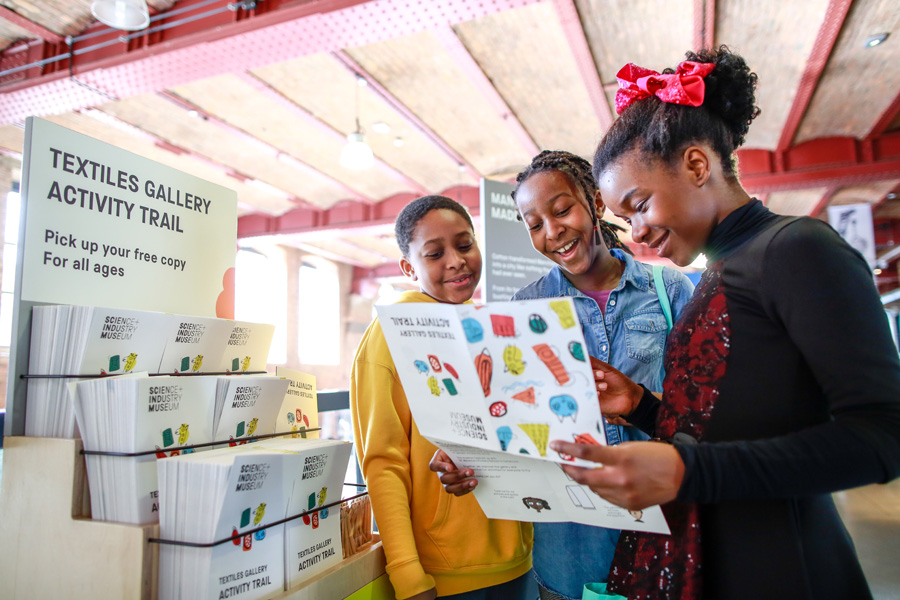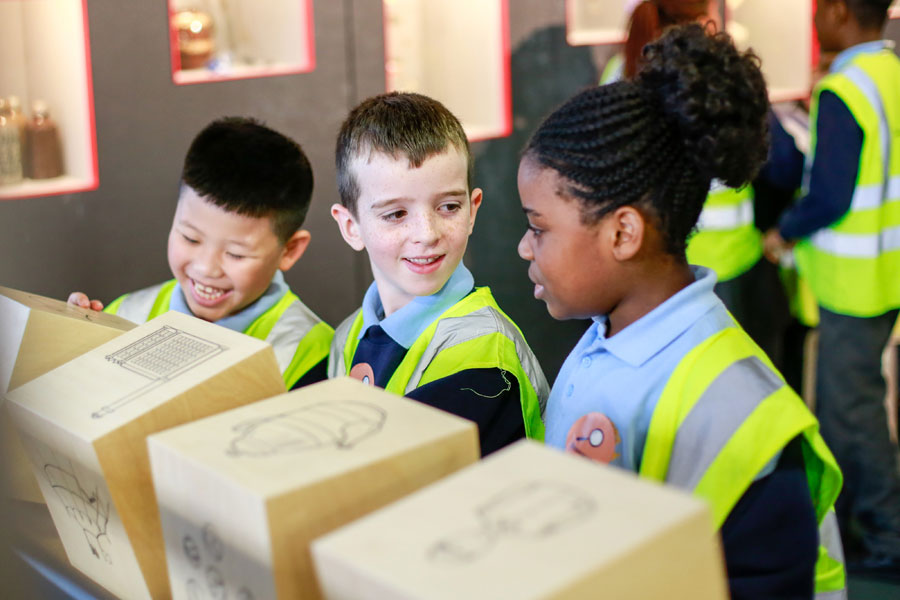
If you stood a 9 year-old in front of a painting of the famous inventor Richard Arkwright, what would they say?
This:
“Why would he have a wig like that? He could have a mohawk!”
It’s a valid point, well made.
This is a quote from our new Textiles Gallery Activity Trail, which visitors can pick up as they enter the gallery. The trail contains challenges, games and object hunts, designed to get visitors to look closer at the gallery in fun and surprising ways.
To create the trail, we partnered with a Year 4 class from St. Malachy’s RC Primary School in Collyhurst. Over three months, the children led each stage of the process. They designed and prototyped activities, created artwork, signed-off design schemes and even delivered gallery tours to their families at the launch event.

The quote above came from part one of the process: researching.
The children visited the gallery and did everything from video interviews to drawing challenges. They discussed their favourite objects and stories, thought about what life was like for the people in the cotton industry, and talked about ideas that made them curious. The result was 39 pages of rich, funny and insightful quotes.

Many of the quotes are seemingly random, funny or sweet. However, if you unpack them a little further, they become more revealing. They demonstrate a deeper connection and understanding of people and themes. They show our young visitors searching for words and comparisons to understand complex ideas. And crucially, they give the museum a fresh perspective on the contents of our gallery and an opportunity to use new voices in our interpretation.
Many quotes feature in the trail and on a slideshow in the gallery. However, these are just a drop in the ocean.
Here’s our top 10 best-of-the-rest list
-
“The machines were quicker but riskier.”
In six words, this really encapsulates a key element of the Industrial Revolution. They’ve weighed up the positive against the negative, and the risk that mill owners took with their workers’ lives, as they chased productivity, wealth and innovation.
-
“It’s like when a bird poos on you.”
This quote was a response to the coins that were placed in the roof of Murrays’ Mills during its construction. People often concealed money to bring luck or wealth. It really shows how kids can understand object stories through finding fun and their own personal experiences, bringing them closer to those people in the past.
-
“Why do people gain more today?”
The children were really surprised by stories of slaves picking cotton and children working in mills. It highlighted to them the relative luxury that many of us are have today and that human rights are now an expectation. But this also allowed us to discuss examples where human rights are still jeopardised and how poverty still exists in plenty of places.
It was great to see the children take this kind of thinking on board, understand just how lucky they are, and maybe even start to think how they can help with those issues still around today.
-
“It would be enjoyable. There’s lots of people to play and talk with.”
The gallery shows stories of cramped living conditions and factories packed with people working dangerous jobs. There were plenty of surprising and touching responses from the kids. They found hope and fun throughout the gallery. Unprompted, they spotted and embraced collectivism and community, even in the squalid conditions of Victorian Manchester.
-
“This jug is like what they use in Africa. Some people are poor and can’t get nice designs so they have jugs like this. They walk to the water and fill up one big jug a week and bring it back.”
The kids from St. Malachy’s were from diverse backgrounds and really recognised the many international links in the gallery. They spotted connections to their own heritage and families, highlighted the things everyone shares wherever you’re from and talked about the international influence on their lives here in Manchester.
-
“Why can’t people buy their own machine?”
The children understood that owning technology gives you power. Growing up in a world of smartphones and the internet, this quote reflects their own experience of having technology at their fingertips and thinking everyone should have had these things even back in the 1800s.
-
“Who found all these lovely detailed shells?”
The people stories behind the objects really fascinated the children. The stories were ways in for the kids to think about bigger concepts and ways their lives related to those of historical people, encouraging them to empathise and explore new ideas further.
-
“It reminds me of London and where the President has meetings.”
The model of Watt’s Warehouse was another really popular object. It’s a grand building that still stands on Manchester’s Portland Street, but now as the Britannia Hotel. The children seemed really surprised that the city they live in could have such ornate and spectacular buildings and be such an important place, both historically and today. Maybe to them, it’s just home.
And finally… two more fun ones…
-
“I wouldn’t [get up at 6am for work]. I don’t like getting up that much.”
Agreed—sometimes the kids said things that just hit the nail on the head.
-
“If you’re the boss and people disrespect the mill, you could just get a massive crane and throw them to the other side of the world.”
Let’s hope our museum director doesn’t get this idea.
Museums are often thought of as places that children visit to learn. The Science and Industry Museum has been that for decades, welcoming countless school visits and family trips over the years. But the best thing about this project has been seeing how we can learn from them too. The children were open, honest, inquisitive and curious.
Their unfiltered comments have not only helped us to create an entertaining activity trail for the Textiles Gallery, but also made us think about our work in different ways, influenced how we approach historical objects, and might just give Richard Arkwright thousands of new haircuts!
The Textiles Gallery Activity Trail is free and available in the gallery year-round. Please pick one up next time you visit and let us know what you think.